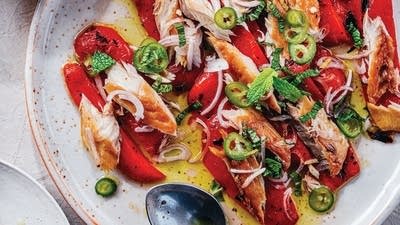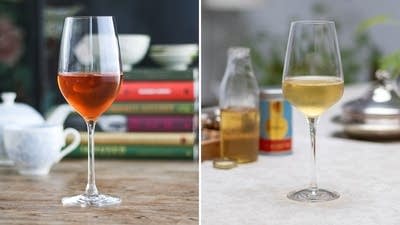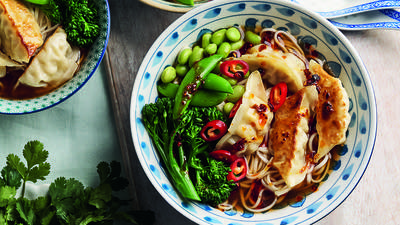
Chef Jacques Pépin talks with guest host Francis Lam about why roast chicken is so iconic for French chefs, the importance of technique, and what he cooks at home.
Francis Lam: I noticed in your new book, the very first recipe is for a simple roast chicken: no brining, no spicing, just a hot pan and a hot oven. So, let me ask you, why is a simple roast chicken such an iconic dish for French chefs?
 Poulets & Legumes: My Favorite Chicken & Vegetable Recipes
Poulets & Legumes: My Favorite Chicken & Vegetable Recipes
Jacques Pépin: For different reasons. It's like a hard-cooked egg -- something that there is no recovery from if you don't do it right. It's so simple, like a bread, when you have a real bread made with flour and water and yeast, and that's it. It has to be done right. Otherwise, there is no recovery.
FL: So, it's almost like a test. You're testing yourself.
JP: Yes. Well, of course, the quality of the chicken is very, very important, the quality of the pan that you cook it in. You cook with a thin, stainless steel pan, and the heat transfer is bad with stainless steel, a thin pan, and so the crystallization of the juice -- the juice which comes out and crystallizes in the bottom of the pan -- that's what we call the "glaze." And the process of deglazing is to add liquid to those glazes to release them and to create a natural juice. Well, with that stainless steel pan, the glaze burns, so you have black spots there, and when you release those juices, it's bitter because it's burnt. So the quality of the pan, the quality of the chicken, the piece of butter, and, of course, a hot oven -- that's all important.
FL: What kind of pan do you like to cook the chicken in?
JP: If you cook dry, something, a piece of meat or roasting a chicken or anything like this, you want the quality of the metal -- thick, heavy aluminum, copper liner -- so that you get crystallization of the juice and create a sauce. If you cook wet -- that's if you do a soup, or you boil water for spaghetti, or you do anything like that -- then you use stainless steel, a thin metal. It transfers very fast. It's good for wet cooking, not for dry cooking. So, the chicken would have to be done in thick, heavy aluminum or copper, something which is going to create a terrific natural juice for me.
FL: Yeah. Do you like cast iron?
JP: Cast iron, too. But you get emotionally attached to your cast iron pan from your grandfather or your grandmother, but it's fine for a roast chicken, too. But sometimes when you create certain types of sauce, you have discoloration because of the iron, and sometimes it doesn't work out, but it's good, too.
FL: I love hearing you say this because it's one of the things that I learned in cooking school and also continue to learn not just in cooking but also in life, and that's the more seemingly simple something is, the more you learn to see the different details that really matter that maybe you didn't even realize would've mattered before. Like you said, the quality of the pan actually really matters. What separates, in your mind, a good cook from a great one?
JP: First, you start with technique, because the technique -- that is the manipulation, the manual dexterity of a chef -- for me, is important. You have to become a technician first, whether you're a shoemaker, or whether you're a cabinetmaker or a jeweler or a sculptor or a surgeon, for that matter, or a cook. You have to know your trade. Or whether you're a painter. I paint, too. You can spend two years in art school and learn how to mix yellow and blue and to make green with that and do something with your thumb or with a spatula or with a brush, and after two years, you can stand in front of a landscape and do one painting after another. Does that make you an artist? Not really, but at that level, you're a good technician. If you happen to have talent, however, in your hand, then what you know, the techniques themselves, make you show the talent much better. And I know a lot of chefs-- and I'm not saying that in a derogatory way -- small restaurant chefs, who run their restaurant, do a good food course and run the kitchen well, and they have not much talent, but they are good technicians. They can run the kitchen. The food is good; it's okay. But if you happen to have talent and put a little love in it too, then you get to someone like Thomas Keller or Jean Georges or Daniel in New York or someone, Roland Passot, here, someone who is a great chef.
FL: When you're cooking, maybe at home, what are you enjoying cooking right now?
 Chicken Jardiniere
Chicken Jardiniere
JP: I do. I'm always hungry. As soon as I'm home, I'm cooking, and I've been married 50 years, and for me, the end of the day is really sitting down with my wife and sharing a bottle, sometimes two bottles, of wine and having dinner. It's a ritual which is very important to us, and we've done that forever. But years ago -- certainly in the fifties and sixties when I worked at the Plaza Hotel in Paris or when I came to New York -- the idea was to conform. The chef was not a star. We are genius now. I don't know what happened, but at that time, the idea was to conform. So, you work in a place like the Plaza Hotel in Paris, which was well known, still known, for the lobster soufflé that they used to do, and I think there was...we were 50 chefs in the kitchen. I believe that the 50 chefs, any one of us could have done that lobster soufflé. You would never have known which one had done it because it was a way of conforming. You would work somewhere with a great chef, and you try to imitate, you try to learn the trade this way. The idea was to conform yourself and learn that way, not to express yourself. That didn't really exist too much at the time.
Now, of course, is the opposite. The chef in the kitchen says, "I want to sign that dish and make sure that people know I am the one who created that dish, too." So it gives a great deal of pressure to the chef in the kitchen who has to reinvent himself all the time and try to come up with something different or something new or esoteric. Still, I don't really find anything that exciting about something new because it's new, by itself. I would rather have a roast chicken or something like that, that I know that I can go to that restaurant, and each time, it's just about perfect and better and better. To keep that level of consistency requires a great deal of creativity at a different level because, whether you like it or not, there are no two chickens which are the same -- same amount of fat, the same amount of freshness in it or whatever, the quality of the chicken, the quality of anything else. So each time, in order to get to that same dish and have the same taste each time, then you have minute changes that happen along the way, which are sometimes conscious, and sometimes they are subconscious. But you change to adjust, adjust, adjust, and eventually, you get there.
FL: It's funny because sometimes the question I like to ask chefs to try to get at their philosophy or get at their mentality, “Is it more exciting for you to cook something new or to cook something again?” And hearing you talk just makes me think, the cook-something-again question is not really different than cooking something new.
JP: Yes.
FL: Because when you cook something again, if you learn all the technique, and you learn to see the details, it's sort of cooking something new every time because you have to adjust every time.
JP: Absolutely. When you go to Troisgros, for example, in France, who's very well known for the salmon in sorrel sauce -- I tell you, the guy who does it behind the stove, after maybe 2,000 times that he's done it in the last five years he's there, for that to be perfect each time he does it requires a great deal of knowledge to have that type of consistency. It's quite difficult, and that's where a restaurant is made -- by being consistent and good each time you go, regardless of whether it's new or not. As you said before, it's always new to a certain extent because it's never really the same.
Before you go...
Each week, The Splendid Table brings you stories that expand your world view, inspire you to try something new, and show how food connects us all. We rely on your generous support. For as little as $5 a month, you can have a lasting impact on The Splendid Table. And, when you donate, you’ll join a community of like-minded individuals who love good food, good conversation, and kitchen companionship. Show your love for The Splendid Table with a gift today.
Thank you for your support.
Donate today for as little as $5.00 a month. Your gift only takes a few minutes and has a lasting impact on The Splendid Table and you'll be welcomed into The Splendid Table Co-op.




